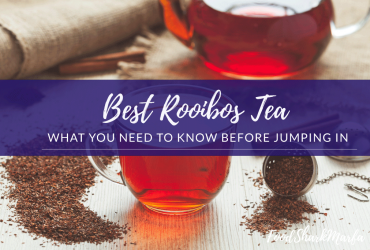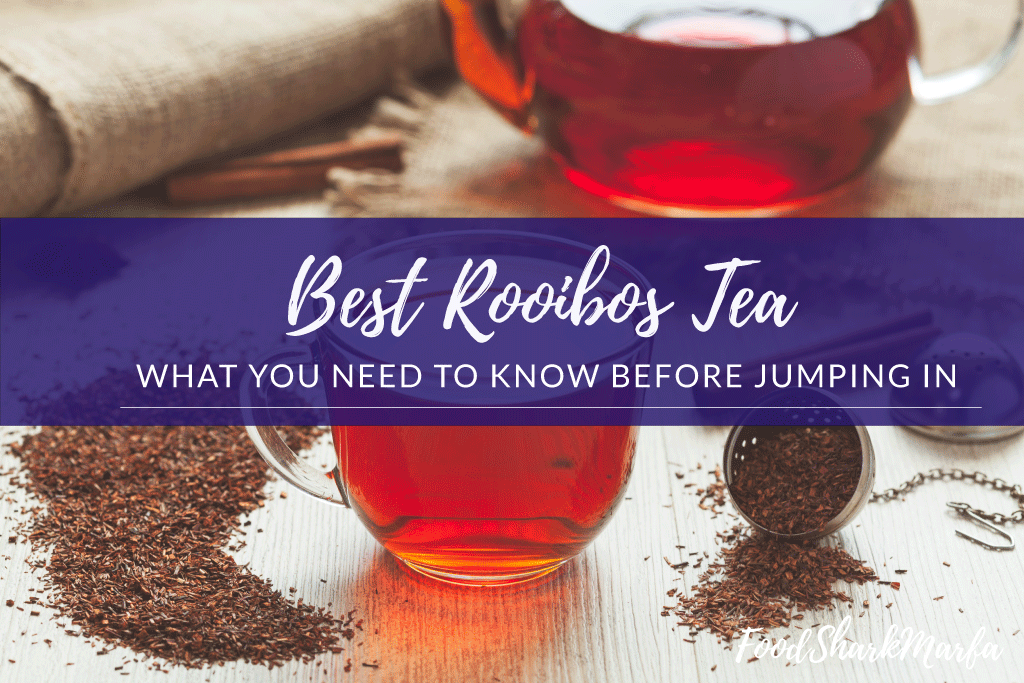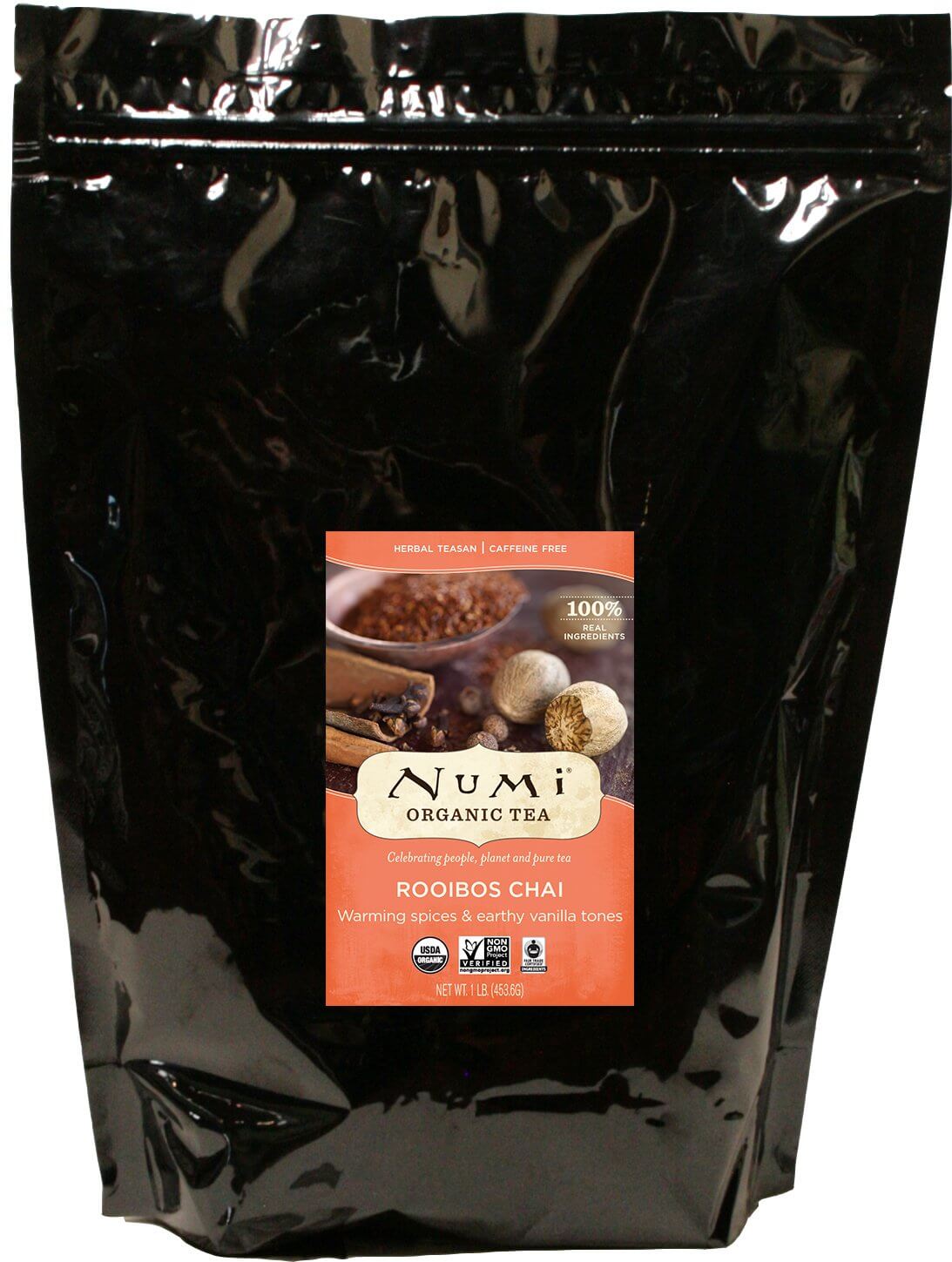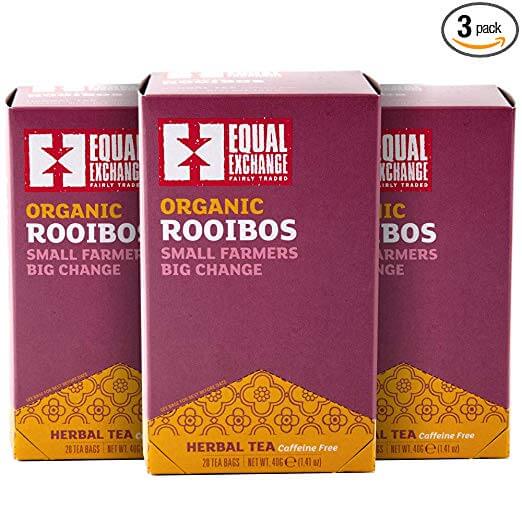The favorite and distinctive drink of South Africa is now easily available to us all. Rooibos or red bush is harvested from the Aspalathus linearis plant which makes it naturally caffeine free, gluten free and vegan (when served black). Rooibos is also rich in beneficial compounds such as antioxidants which are linked with better heart health and diabetes, and these may also have some anti-cancer potential.
As well as looking at some of the early scientific research into rooibos, in this article we also consider what to look for when choosing rooibos tea. We also delve into the tea itself and how it is harvested and processed and some of the ethical considerations when sourcing rooibos. We also review the top ten best rooibos teas to make your choice of rooibos that little bit easier.Budget Pick
The Twinings of London Pure Rooibos Red Tea is our budget pick because of its rich aroma, pleasant taste and ability to instantly lift your mood. The tea leaves are carefully selected and do not include any artificial flavourings. Plus, you can have it at any time of the day because it does not contain any caffeine.
Quick Comparison: Top 15 Best Rooibos Teas
| Product Name | Weight (ounces) | Item Form | No. Of Bags (if any) | Grade |
|---|---|---|---|---|
| Organic Rooibos Chai Tea | 2.15 | teabags | 20 | A |
| Twinings of London Pure Rooibos Red Tea | 19.68 | teabags | 20 | A |
| Davidson’s Organic South African Rooibos | 16.00 | loose leaves | ||
| Traditional Medicinals Organic Reishi Mushroom with Rooibos & Orange Peel Tea | 0.85 | teabags | 96 | B |
| Numi Organic Tea Rooibos | 6.40 | teabags | 18 | A |
| Cederberg Tea Company Red Rooibos | 8.80 | teabags | 100 | B |
| Golden Moon Organic Rooibos | 16.80 | loose leaves | B | |
| MY RED TEA Organic Rooibos Tea | 6.80 | teabags | 80 | A |
| Rooibos Rocks Natural South African Red Tea | 8.82 | teabags | 100 | A |
| Celestial Seasonings Madagascar Vanilla Rooibos | 2.82 | teabags | 20 | A |
| Anthony's Organic Red Rooibos Loose Leaf Tea | 16.0 | loose leaves | B | |
| Numi Organic Tea Rooibos Chai | 15.84 | loose leaves | B | |
| Freshpak Rooibos Tea | 18.72 | teabags | 80 | B |
| 365 by Whole Foods Market Organic Rooibos Tea | 2.80 | teabags | 40 | A |
| Equal Exchange Organic Rooibos Tea | 9.60 | teabags | 60 | A |
1. Organic Rooibos Chai Tea
The Organic Rooibos Chai Tea contains 20 teabags that are packed with a rich combination of rooibos and spices including cinnamon, ginger root, cardamom, cloves and even stevia leaf. The rooibos tea is imported all the way from South Africa whereas the chai tea is imported from India. You will receive the true, organic taste of both flavours in your Organic Rooibos Chai Tea. Moreover, this herbal tea does not include any caffeine.
Pros
Cons
2. Twinings of London Pure Rooibos Red Tea
Coming as six boxes with 20 individually wrapped tea bags in each, the Twinings of London pure rooibos red tea has a fresh and woody taste which is slightly sweet. This can also have more of the distinctive red tint to it than other rooibos. Although this is ethically sourced, this kosher rooibos does not carry any Fair Trade or other accreditations, and neither is it organic.
Pros
Cons
3. Davidson’s Organic South African Rooibos
The 16 oz resealable pack of Davidson’s Organics South African rooibos is also Fair Trade certified and kosher. This a naturally caffeine free full bodied rooibos with a strong color. You may need to use an extra-fine infuser as this can be a very fine leaf which will otherwise leave sediment in the cup. Some have also found that its flavor and fragrance can be weaker than other rooibos.
Pros
Cons
4.Traditional Medicinals Organic Reishi Mushroom with Rooibos & Orange Peel Tea
The 0.85-ounce recyclable pack of Traditional Medicinals Organic Reishi Mushroom with Rooibos & Orange Peel Tea has a Reishi mushroom flavour. This tea is known to boost your immune system and hence, make your body healthier. You will receive a pack of 6, each containing 16 teabags. This means that you will receive a total of 96 teabags. This tea pack from Traditional Medicinals has a sweet, citrusy taste and it has a pleasant aroma that helps you relax and free your mind instantly.
Pros
Cons
5. Numi Organic Tea Rooibos
Non-GMO Project Verified, the Numi organic tea rooibos is also Verified Fair Labor and a Certified B Corporation and social enterprise. This rooibos is free from any artificial flavors or additives. The six packs of 18 biodegradable tea bags (total 108 tea bags) are also halal and kosher. This rooibos has an earthy and deep vanilla taste and some drinkers may find it too earthy.
Pros
Cons
6. Cederberg Tea Company Red Rooibos
The 100 count box contains five foil pouches of bleach free tea bags which are recyclable and string free. This is fresher rooibos which is distributed not long after processing so it can have a stronger flavor, although some may also find it a little bitter. This rooibos is certified USDA organic.
Pros
Cons
7. Golden Moon Organic Rooibos
Golden Moon sources its ingredients from well-maintained farms in the Western Cape Mountains of Cederberg South Africa. Only the best, high-quality rooibos tea leaves are included in its packaging. Golden Moon ensures that all its tea leaves are in line with their quality standards. The tea has a rich, earthy or woodsy flavour and you may also get the taste of toasted caramel and black pepper. You can have it with milk, lemon juice or even honey.
Pros
Cons
8. MY RED TEA Organic Rooibos Tea
The sustainably farmed and ‘Farmer Friendly’ MY RED TEA organic rooibos tea is also certified GMO free. The sustainably packaged box of 80 unbleached and unwrapped tea bags are free from strings which some drinkers may not be as keen. These rooibos tea bags do seem to have a lighter flavor than other rooibos, so you may want to use multiple bags or prefer to brew it as an iced tea.
Pros
Cons
9. Rooibos Rocks Natural South African Red Tea
The USDA organic, sustainably and ethically farmed Rooibos Rocks natural South African red tea is full bodied, mildly sweet and lacks any bitter aftertaste. This is a box of 100 count tea bags which are inner-wrapped in packs of 20. This rooibos is also kosher, and the manufacturer offers a money back satisfaction. Some consider this is a weak rooibos and if you do prefer a stronger brew you may need to use two tea bags per cup.
Pros
Cons
10. Celestial Seasonings Madagascar Vanilla Rooibos
Naturally free from caffeine and gluten, the Celestial Seasonings Madagascar vanilla rooibos contains rooibos which has been infused with natural French vanilla flavor and vanilla bean to give a sweeter tasting brew. Although this is not an organic blend, it is free from any artificial preservatives, flavors or colors.
Coming as a six box pack containing 20 tea bags each, the bags are free from strings and staples to minimize waste. This may mean they will not stay fresh as long as individually wrapped/foil wrapped tea bags. The boxes are also recycled card. The vanilla flavor of this blend may also be too subtle to stand out against the rooibosPros
Cons
11. Anthony's Organic Red Rooibos Loose Leaf Tea
The USDA certified organic Anthony’s Premium Organic Teas red rooibos tea is also verified gluten free and non-GMO. This comes as a 1 lb. resealable pack of loose rooibos. This is a weaker rooibos and there may be more stems and dust than you would expect from a loose tea and it appears there can be some flavor difference between the batches of this tea.
Pros
Cons
12. Numi Organic Tea Rooibos Chai
The Numi Organic Tea Rooibos Chai is a blend of rooibos and spices. It includes spices such as Piquant cloves, nutmeg, cinnamon with sweet allspice, ginger and a hint of cardamon. This tea has the original herbal taste that might suit your preference. You can use the tea leaves in tea infusers, French presses or in tea balls. The Numi Organic Tea Rooibos Chai has tons of health benefits that allow you to feel better while enjoying your cup of tea.
Pros
Cons
13. Freshpak Rooibos Tea
A fuller bodied rooibos, the Freshpak rooibos tea comes as a pack of 80 string free tea bags. This is a brand which is a bestseller and ‘everyday’ rooibos in South Africa. The bags can be quite dusty, and some consider that the flavor is easily lost as the rooibos ages. This is not an organic or Fair Trade rooibos.
Pros
Cons
14. 365 by Whole Foods Market Organic Rooibos Tea
365 by Whole Foods Market Organic Rooibos Tea includes high-quality, premium tea bags that do not include any caffeine. It is blended with rooibos, orange and vanilla extracts. The tea gives off a strong aroma that fills up the room. It has a deep, wine-like red colour and an earthy flavour. You may also get a pinch of sweetness when sipping on the tea. 365 by Whole Foods Market ensures that the tea bags are free of harmful chemicals and additives. All its ingredients are carefully selected to ensure maximum benefits.
Pros
Cons
15. Equal Exchange Organic Rooibos Tea
The USDA certified organic and Fair Trade, the Equal Exchange organic rooibos has flavors of sweet cedar, pine, vanilla and almond paste. This rooibos is also certified kosher and is bought directly from democratically-organized groups of small-scale farmers. The packaging is recycled paperboard and each tea bag is individually wrapped. Although this comes as a three pack of 20 tea bag count (total 60 tea bags), you may only receive one box, and this will cost more than other organic rooibos.
Pros
Cons
Things to Consider Before Buying Rooibos
Rooibos (pronounced ‘roy-boss’) or red bush is not a true tea as it does not come from the Camellia sinensis plant. Instead, rooibos is harvested in summer and early autumn from a shrub-like plant called Aspalathus linearis which is native to the South African Cedarberg Mountains (north west of Cape Town). Rooibos was known to be drank in the 1700s and was known as a ‘medicinal’ plant as far back as 1932.
Rooibos is naturally caffeine free and as well as drinking it as a black tea, rooibos can be used in many recipes as a substitute for water or milk; it is even fine for using in savory dishes such as casseroles where it not only adds flavor but also tenderizes meat. Dried fruit for baking can be soaked overnight in rooibos so that you do not need to add any sugar when cooking.
Nutritional Content of Rooibos
As well as being caffeine free, rooibos is lower in tannins than black and green teas. This can be beneficial for those with iron disorders as tannins as well as caffeine can stop nutrients such as iron from being absorbed properly.
Rooibos is also free from oxalic acid. Found in black teas and a lower amount in green teas, taking in a higher quantity of oxalic acid can increase your risk of developing kidney stones.
Rooibos does not contain any calories, fat, carbs, protein or fiber. It does however contain 7.6 mg of sodium per 200 ml serving – making it a very low sodium food.
Rooibos Production
In spring, small yellow flowers appear on the bush and each flower produces a legume with one seed inside. As the seed pops out when ripe, farmers usually have to sift through the sand around the plant to collect the seeds.
These seeds are sown in spring and the seedlings planted early summer. The plant will need around 18 months to grown before it can be harvested for the first time. During summer harvest, the plants are cut down to about a foot from the ground. Once a plant has been through three to five harvests, the plantation has to be re-established.
The shoots which are harvested are bound into sheaves and cut to less than 4 mm. Stems and green leaves which are dried as soon as they are harvested are sold as green rooibos which has a grassier flavor and is usually more expensive.
Otherwise, the stems and leaves are ‘bruised’ and are fermented in heaps. The fermentation takes place through enzymes in the plant and this oxidation process causes the leaves to turn red and develop its distinct aroma. Once fermented, the leaves are spread out and allowed to sun dry.
The rooibos can then be graded on its flavor, color, aroma and cut length and once steam pasteurized is sent as bulk leaves to South African exporters and packers.
The Rooibos Market and Marginalization
Over the last couple of decades, production of rooibos has increased drastically as new consumers discover its flavor and many more people seek out caffeine-free alternatives. South Africans consume as much as 5000 tons of rooibos per year and over 6000 tons per year are now exported.
The US currently makes up around 5% of the rooibos market. Germany, the Netherlands, the United Kingdom and Japan are the other four biggest importers of rooibos.
When choosing rooibos tea, you may want to consider rooibos from plantations which meet social and ethical responsibilities; particularly those which pay fair salaries to rooibos workers. Many smaller rooibos farmers were historically displaced through colonialism and then apartheid. During this time, the South African government also imposed a 40-year monopoly on rooibos. Even today, many small farmers remain marginalized - 98% of the rooibos harvest is produced by just 350 commercial farmers.
Various organic certifications, Fair Trade and UTZ Certification (part of the Rainforest Alliance) are just some bodies helping improve small-scale farmers access to global markets, as well as helping workers receive fairer wages and access better living standards.
Safety of Rooibos
Rooibos is steam pasteurized before it is packaged, and all exported Rooibos has to pass inspection by the Perishable Products Export Control Board (PPECB) of South Africa and be certified free from impurities and bacteria.
In a similar way that grapefruit can interact with some medications, rooibos appears to inhibit a liver enzyme system which is needed to metabolize certain drugs. If you take any medications, do check with your pharmacist that it is safe to drink rooibos.
Some of the compounds in rooibos can mildly stimulate estrogen production, so some experts have suggested that those with breast cancer or other hormone-sensitive conditions may want to avoid drinking rooibos.
Otherwise, rooibos appears to be very safe with any reported negative side effects being extremely rare.
Benefits of Drinking Rooibos
Rooibos is rich in antioxidants and there is some evidence that antioxidant levels in the body can be increased when drinking rooibos, although any observed increase does not last for long.
Tips for a Perfect Cup of Rooibos
The water for rooibos should have a neutral pH and not be over-boiled as this will have depleted the oxygen and will prevent the rooibos from infusing properly.
When brewing with loose rooibos use one heaped teaspoon per cup. Allow the tea (or tea bag) to infuse for two to three minutes before serving. If it is left to steep for longer, its antioxidant benefits increase.
You can then add milk, sugar, sweetener, agave or honey to taste. As rooibos is not as astringent as black tea, it will not need as much sugar or sweetener adding. It can also be reheated without becoming bitter or losing its flavor.
Unlike other teas, rooibos ages well and it can be stored for a long time without any impact on its flavor, taste and quality.
Links Between Rooibos and Health
Unlike other teas such as green and black which have been researched in some detail, evidence of the benefits of rooibos on health is still limited. Like other teas it does contain antioxidants and it seems to be able to improve the availability of iron from the diet in the body.
The antioxidants in rooibos are linked to better blood pressure as it may inhibit ACE (angiotensin-converting enzyme). ACE indirectly causes blood vessels to contract which increases blood pressure and in a small study of 17 people, rooibos tea was able to inhibit ACE activity for up to 60 minutes after it was drunk. This did not give any actual changes to their blood pressure though.
Rooibos may also improve cholesterol levels in overweight adults with greater heart disease risk. After drinking six cups a day for six weeks, the 40 adults had lower levels of LDL (‘bad’) cholesterol and higher levels of HDL (‘good’) cholesterol.
Rooibos is currently the only known natural source of aspalathin. This antioxidant may have anti-diabetic potential as it has been able to improve blood sugar levels and reduce insulin resistance in mice. Aspalathin may also help diabetics reduce their risk of atherosclerosis and vascular inflammation which contribute to the development of heart conditions.
Luteolin and quercetin, two of the antioxidants in rooibos have been able to kill cancer cells and stop tumor growth in the laboratory. It is worth noting that rooibos is only a small source of these antioxidants – you can obtain more from fruit and vegetables.
FAQ
How many cups of rooibos tea should I drink daily?
It is safe to drink up to six cups of rooibos tea daily. But, it is best if you limit it to 2-3 cups everyday. If you consume a large amount of rooibos tea, it is unlikely to deteriorate your health.
Can children drink rooibos tea?
Yes, they definitely can. If your child has an upset stomach, you might want to give him/her a cup of rooibos tea. The rooibos tea is known to sooth stomach aches and promote a healthier immune system.
Can I lose weight by drinking rooibos tea?
You might be able to lose weight by drinking rooibos tea. Rooibos tea is likely to increase your metabolism rate and prevents fat cells from forming. However, you should control your diet and exercise regularly side by side for best results.
Will a cup of rooibos tea help me sleep better?
Rooibos tea does not usually contain any caffeine which means that you will not be up all night if you have it. Since it is a herbal drink, it will help you relax and ease your mind. You may actually sleep better by drinking a cup of rooibos tea.
Conclusion
When drunk black, rooibos tea offers a naturally caffeine and calorie free drink which is suitable for many types of diets and lifestyle. Although much of the rooibos produced is consumed by South Africans, it is now readily available globally and many more of us are beginning to appreciate the distinctive flavor and possible health benefits of rooibos.
Its production is not without debate though, having been harvested through darker times of South African history, but by choosing rooibos which is ethically sourced and sustainable it helps ensure that all of us gain the maximum benefit from rooibos tea. We do hope that you have enjoyed this article and that you now feel confident in choosing the best rooibos tea for your caffeine-free requirements.


















Related Posts
The 10 Best Green Teas in 2023
The 10 Best Oolong Teas in 2023
The 12 Best Detox Teas in 2023